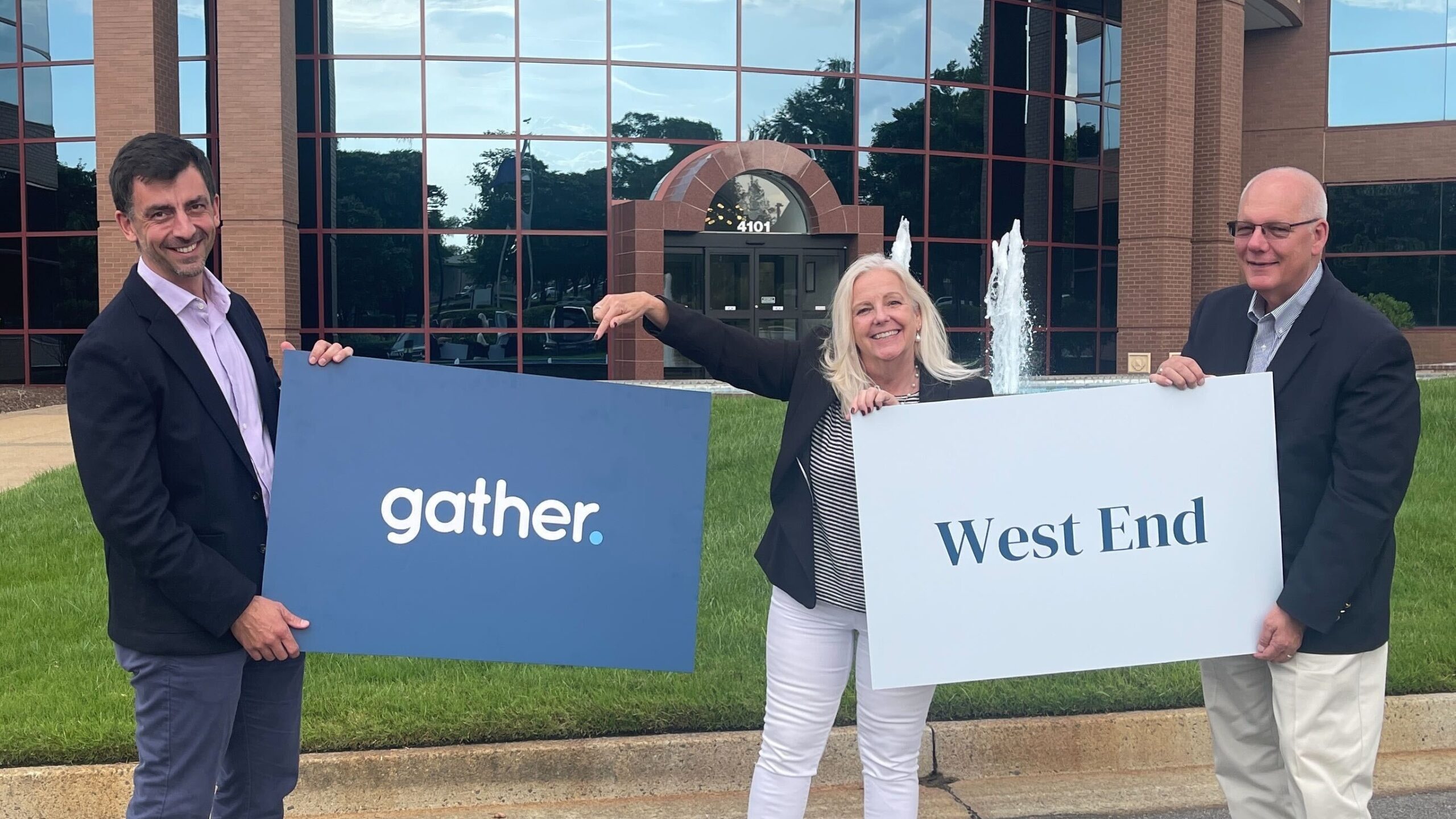
The Highwoods Centre building at 4101 Cox Road, where the new Gather West End is planned to open next year. (Image courtesy Henrico County)
A new coworking space in the works at Innsbrook is providing an opportunity for Henrico to lure more international businesses, part of a broader effort by the county’s Economic Development Authority to fill more of Henrico’s empty office space.
The EDA this week announced the launch of the Henrico Global Business Gateway, an initiative to attract and incentivize established, foreign-based companies to expand operations to the U.S.
A collaboration with Highwoods Properties and coworking company Gather, the program will be based in the new Gather West End that’s planned at the Highwoods Centre building at 4101 Cox Road, near Innsbrook’s southern entrance off Broad Street.
Participating companies would receive dedicated office space for up to three employees at a reduced cost, among other incentives, to establish their first U.S. presence at Gather West End. The reduced cost would last for 12 to 18 months, after which companies would move to available office space in Innsbrook or elsewhere in Henrico.
Participants also would receive business consulting services, professional services such as legal counsel and immigration consulting, recruiting and hiring assistance, business development and networking, and relocation assistance for staff and their families.
The program will begin operations early next year, when Gather West End is slated to open on the building’s second floor. The coworking space will fill the entire floor with capacity for more than 300 people across 19,000 square feet.

Gather co-owners James Crenshaw, Polly White and Doug White, from left, outside the coworking brand’s upcoming eighth location. (File photo courtesy Gather)
The program will launch with Rego Inc., an Africa-based financial tech firm, as its first participant, the EDA said in its announcement.
The initiative is part of a broader effort by Henrico to incentivize improvements and fill its stock of available office space, which many companies have vacated or downsized amid the work-from-home trends that came with the pandemic.
In a presentation to county supervisors at a retreat last week, EDA Executive Director Anthony Romanello said Henrico’s office vacancy rate stands at 13%, compared to 21% nationally and 24% in the Northern Virginia region. That’s 13% of more than 23 million square feet of non-governmental office space that exists in Henrico.
“It’s no secret that every company in the world has been evaluating office space since the pandemic,” Romanello told the board. “We are really trying to adapt as best we can to what we think are emerging trends, but nobody has the answer.”
He noted recent moves by some of the county’s larger employers, such as Elephant Insurance’s relocation and downsizing of its headquarters in the county; Truist’s office consolidation to the former SunTrust campus in Manchester; fewer in-office workers at the former Anthem campus near Willow Lawn; and Capital One’s nearly complete exodus from Innsbrook.
Bucking the trend was BHE GT&S, a division of Berkshire Hathaway Energy, that bought two of Capital One’s buildings in Innsbrook and fully staffed them once employees were vaccinated, Romanello said.
Another trend across the country has been conversions of vacant office buildings to residential use, though Henrico is looking to buck that trend by incentivizing improvements to turn certain buildings into so-called “trophy” office space, attractive to companies for their amenities such as gyms and commercial kitchens that are aimed at drawing workers back to the office.
The county’s Henrico Office Task Force, consisting of property owners such as Highwoods and other stakeholders, convened last year and recommended three steps to address office vacancies, including creation of an office renovation program in which CoStar-rated four-star buildings would receive incentives for upgrades of at least $250,000 to make them trophy spaces.
The EDA would reimburse up to 50 percent of actual costs up to $500,000 after work is completed. Romanello said the county has 26 four-star office properties totaling over 3 million square feet.
“This level of investment is required to keep businesses here or to give us the product that we’re going to need to attract new businesses to the county,” he said.
Romanello said the only trophy office space in the region is the new Dominion Energy tower in downtown Richmond. He said Henrico has had one new out-of-market office prospect in the last four years, and that the company said it could shortlist Henrico with a trophy-space upgrade of one of its four-star properties.
“I think there’s a real moment that we have right now as folks around the world are looking at their office space needs,” Romanello told the board. “They can come to a place where they’ve got a great labor supply, they can get in for a good cost. The thing we don’t have is that trophy office space to attract them here.”
The office task force also recommended expanding Henrico’s technology zone beyond Innsbrook to include all office space in the county, and to enhance the county’s commercial rehab tax credit program by reducing the minimum building age from 26 to 20 years (the minimum is 15 years in a technology or enterprise zone), increasing the tax exemption period from seven to 15 years, and reducing the minimum assessment increase from 40 to 30 percent. Eligible buildings must be 80,000 square feet or larger and converted to commercial.
Supervisors responded receptively to the recommendations, which county officials said would be formally proposed to the board at a later date.
“I’m in favor of everything you can do to implement a policy that saves office,” Supervisor Dan Schmitt said at the retreat.
“It’s a national epidemic, but I don’t want to run from office. I want to be prepared in years to come to be nimble, because where is it going? I don’t think it’s going away forever; I think it’s going to be different,” he said. “I’m in favor of any policy that helps save office and reduces this kneejerk reaction to convert every office to residential.”
Of the Henrico Global Business Gateway program, Supervisor Misty Whitehead added: “That sounds incredibly forward-thinking and exciting as we consider how much more of a global economy we have.”
Romanello said the idea for the Global Business Gateway arose from discussions with Highwoods, which he noted is the county’s largest office owner, and its plans for the Innsbrook Gather location. He told the board that the program would add to the number of foreign-based companies already doing business in Henrico.
“We’ve got 75 companies that are foreign-based in the county, and we think this is a real opportunity to grow these,” he said.

The Highwoods Centre building at 4101 Cox Road, where the new Gather West End is planned to open next year. (Image courtesy Henrico County)
A new coworking space in the works at Innsbrook is providing an opportunity for Henrico to lure more international businesses, part of a broader effort by the county’s Economic Development Authority to fill more of Henrico’s empty office space.
The EDA this week announced the launch of the Henrico Global Business Gateway, an initiative to attract and incentivize established, foreign-based companies to expand operations to the U.S.
A collaboration with Highwoods Properties and coworking company Gather, the program will be based in the new Gather West End that’s planned at the Highwoods Centre building at 4101 Cox Road, near Innsbrook’s southern entrance off Broad Street.
Participating companies would receive dedicated office space for up to three employees at a reduced cost, among other incentives, to establish their first U.S. presence at Gather West End. The reduced cost would last for 12 to 18 months, after which companies would move to available office space in Innsbrook or elsewhere in Henrico.
Participants also would receive business consulting services, professional services such as legal counsel and immigration consulting, recruiting and hiring assistance, business development and networking, and relocation assistance for staff and their families.
The program will begin operations early next year, when Gather West End is slated to open on the building’s second floor. The coworking space will fill the entire floor with capacity for more than 300 people across 19,000 square feet.

Gather co-owners James Crenshaw, Polly White and Doug White, from left, outside the coworking brand’s upcoming eighth location. (File photo courtesy Gather)
The program will launch with Rego Inc., an Africa-based financial tech firm, as its first participant, the EDA said in its announcement.
The initiative is part of a broader effort by Henrico to incentivize improvements and fill its stock of available office space, which many companies have vacated or downsized amid the work-from-home trends that came with the pandemic.
In a presentation to county supervisors at a retreat last week, EDA Executive Director Anthony Romanello said Henrico’s office vacancy rate stands at 13%, compared to 21% nationally and 24% in the Northern Virginia region. That’s 13% of more than 23 million square feet of non-governmental office space that exists in Henrico.
“It’s no secret that every company in the world has been evaluating office space since the pandemic,” Romanello told the board. “We are really trying to adapt as best we can to what we think are emerging trends, but nobody has the answer.”
He noted recent moves by some of the county’s larger employers, such as Elephant Insurance’s relocation and downsizing of its headquarters in the county; Truist’s office consolidation to the former SunTrust campus in Manchester; fewer in-office workers at the former Anthem campus near Willow Lawn; and Capital One’s nearly complete exodus from Innsbrook.
Bucking the trend was BHE GT&S, a division of Berkshire Hathaway Energy, that bought two of Capital One’s buildings in Innsbrook and fully staffed them once employees were vaccinated, Romanello said.
Another trend across the country has been conversions of vacant office buildings to residential use, though Henrico is looking to buck that trend by incentivizing improvements to turn certain buildings into so-called “trophy” office space, attractive to companies for their amenities such as gyms and commercial kitchens that are aimed at drawing workers back to the office.
The county’s Henrico Office Task Force, consisting of property owners such as Highwoods and other stakeholders, convened last year and recommended three steps to address office vacancies, including creation of an office renovation program in which CoStar-rated four-star buildings would receive incentives for upgrades of at least $250,000 to make them trophy spaces.
The EDA would reimburse up to 50 percent of actual costs up to $500,000 after work is completed. Romanello said the county has 26 four-star office properties totaling over 3 million square feet.
“This level of investment is required to keep businesses here or to give us the product that we’re going to need to attract new businesses to the county,” he said.
Romanello said the only trophy office space in the region is the new Dominion Energy tower in downtown Richmond. He said Henrico has had one new out-of-market office prospect in the last four years, and that the company said it could shortlist Henrico with a trophy-space upgrade of one of its four-star properties.
“I think there’s a real moment that we have right now as folks around the world are looking at their office space needs,” Romanello told the board. “They can come to a place where they’ve got a great labor supply, they can get in for a good cost. The thing we don’t have is that trophy office space to attract them here.”
The office task force also recommended expanding Henrico’s technology zone beyond Innsbrook to include all office space in the county, and to enhance the county’s commercial rehab tax credit program by reducing the minimum building age from 26 to 20 years (the minimum is 15 years in a technology or enterprise zone), increasing the tax exemption period from seven to 15 years, and reducing the minimum assessment increase from 40 to 30 percent. Eligible buildings must be 80,000 square feet or larger and converted to commercial.
Supervisors responded receptively to the recommendations, which county officials said would be formally proposed to the board at a later date.
“I’m in favor of everything you can do to implement a policy that saves office,” Supervisor Dan Schmitt said at the retreat.
“It’s a national epidemic, but I don’t want to run from office. I want to be prepared in years to come to be nimble, because where is it going? I don’t think it’s going away forever; I think it’s going to be different,” he said. “I’m in favor of any policy that helps save office and reduces this kneejerk reaction to convert every office to residential.”
Of the Henrico Global Business Gateway program, Supervisor Misty Whitehead added: “That sounds incredibly forward-thinking and exciting as we consider how much more of a global economy we have.”
Romanello said the idea for the Global Business Gateway arose from discussions with Highwoods, which he noted is the county’s largest office owner, and its plans for the Innsbrook Gather location. He told the board that the program would add to the number of foreign-based companies already doing business in Henrico.
“We’ve got 75 companies that are foreign-based in the county, and we think this is a real opportunity to grow these,” he said.






Why is the county using my tax dollars to subsidize foreign companies? Are there no Henrico residents or local businesses that need help to obtain or expand offices?
David, that’s a good question. But I think that there’s a good answer. Incentivizing people to move to the area expands the tax base. Incentivizing people who are already there, less so. It doesn’t mean there’s not room for some sort of local-based incubator, but it would also be competing with incubators in the city, so the odds of success are lower. Just my opinion.
John – spot on, 100% on all points. The county’s potential ROI with this initiative is tremendous. Metro markets such as Raleigh, Nashville, Charlotte and Austin have “greased the wheels” to bring companies there for the past couple of decades, and the results have been incredible. A recent NYT analysis of data from the Bureau of Labor Statistics bears out some incredible numbers regarding the post-pandemic recovery. Here are the job growth statistics for the four metros mentioned above from 2019 to 2023: Durham County, NC (Raleigh-Durham) added 22,290 jobs (up 11%) Davidson County, TN (Nashville) added 36,620 jobs (up… Read more »
Brilliant and proactive Henrico continues to run circles around Richmond, expanding its tax base and enriching the area. Meanwhile, the city seems fixated on extracting as much money as possible from its residents with burdensome bureaucracy, bogus restaurant tax schemes and sky-high property taxes, which to my count haven’t been lowered in 15 years despite valuations more than doubling.
And what is the city doing about the glut of office space and state agencies vacating downtown? (Insert cricket sound here.)
I keep hearing about a lack of housing (affordable or otherwise), but now the Henrico BoS is bemoaning the idea of converting existing vacant commercial space to residential? And instead they’re going subsidize backfilling it with tenants from other continents?
The city in general is certainly a trainwreck compared to Henrico, but it at least seems to understand the concept of allowing the market to decide what to do with commercial space, including converting it to residential use.
But Richmond has a quadruple A baseball team that is going to cost them a few hundred million $
BGE gas was located (at time of sale from Dominion) in the Reynolds Crossings. Interesting the success listed in the presentation was an inter-county relocation.
What data is the county seeing that the rest of the US is not? I am seeing no push for more “return to office” space demand, regardless of fancy coffee machines or putting greens. I am seeing more employees stating “if you make me come back in the office to take zoom calls I will resign. Take your pick.” And the labor pool of talent is not out there for equally trained folks ready to backfill the spots of those folks who may resign because of return to office. Training new employees because I fired everyone who wants to work… Read more »